Australia bushfires: New South Wales declares state of emergency
- Published
The fires have already destroyed at least 200 homes, as Jon Donnison reports
A state of emergency has been declared in New South Wales as Australian firefighters battle bushfires that have already destroyed more than 200 homes.
The announcement comes as conditions look set to deteriorate with soaring temperatures and strong winds expected to fan the flames in the coming days.
The Blue Mountains, west of Sydney, has been the worst-hit region with some fires still raging out of control.
State officials say they are the most dangerous conditions in 40 years.
New South Wales Premier Barry O'Farrell said the declaration would give emergency services additional powers over the next 30 days.
These could include cutting gas and power supplies if needed and ordering mandatory evacuations.
"We're planning for the worst but hoping for the best," he said.
One man has died - possibly of a heart attack - while trying to protect his home. Hundreds of people have been left homeless by the bushfires.
One firefighter, 24-year-old Tim Boxwell, said he had lost his own home in Winmalee, on the eastern edge of the Blue Mountains, to the fire while he was on duty.
"I'd been standing watching other people's houses burn and the emotion from that was bad enough. To be hit with your own house being lost was a shock as well," he told BBC's Newshour.
'Unparalleled risk'
Officials have warned that the three main bushfires - two in the Blue Mountains and one near the town of Lithgow - could become one huge fire in the coming days, possibly threatening Sydney.
A fire service spokesman said: "We can understand the magnitude of that as it would then creep into the bottom end of Sydney. It's certainly something that we're very concerned about."
Firefighter Tim Boxwell's own house was destroyed as he was out fighting the fires nearby
The foot of the Blue Mountains lies just across the Nepean River from the suburbs of Sydney. Some embers jumped its banks last Thursday, starting a fire at Castlereagh near Penrith.
After several cooler days, forecasters are predicting the return of unseasonably hot weather - with temperatures reaching 30C (86F) and higher.
The heat wave would probably peak on Wednesday, warned Rural Fire Service Commissioner Shane Fitzsimmons, but there would be little relief in the intervening period.
"We've got what would be unparalleled in terms of risk and exposure to the Blue Mountains throughout this week. If you are to draw a parallel, and it's always dangerous to draw a parallel, at best you'd be going back to time periods in the late 60s.
"The reality is, however, these conditions that we're looking at are a whole new ball game and in a league of their own," the commissioner said.
Mr O'Farrell said crews had carried out controlled burn operations overnight to strengthen buffer zones around the major fires.
An emergency warning was issued for the Blue Mountains village of Bell on Sunday morning.
Residents were urged to evacuate or to take shelter "in a solid structure when the fire front arrives".
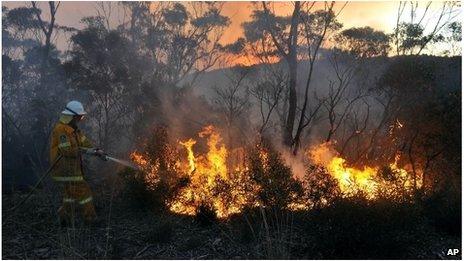
Crews are struggling to contain many of the bushfire, including this one in Bell
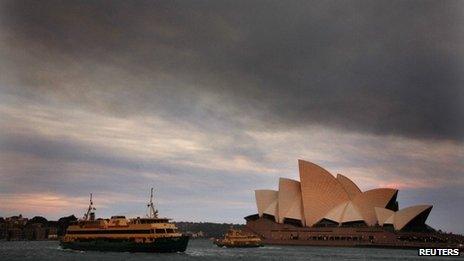
Fears are growing that the fires could reach Sydney - smoke can already be seen over the famous opera house
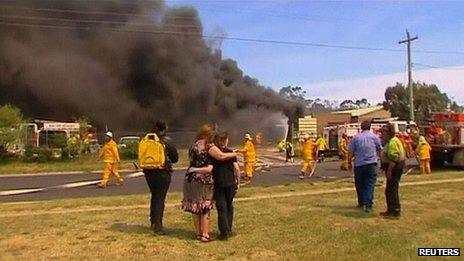
This year's fires have come unusually early after unseasonably hot weather
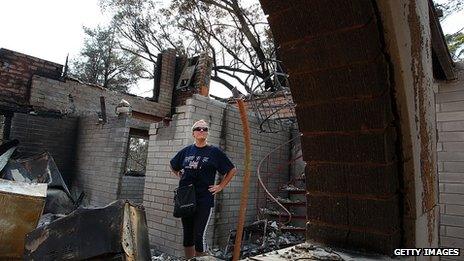
Lyndal Rogers has seen her childhood home in Winmalee destroyed
Villagers in Mount Wilson and Mount Irvine, meanwhile, were ordered to stay in their homes after fire cut off access roads.
Residents of nearby Bilpin were warned that if they did not evacuate, they could be isolated without power for several days.
Assistant police commissioner Alan Clarke said mandatory evacuation orders would be enforced in some areas, describing the risk as "far more extreme" than in past fires.
"At the end of the day we hope we have buildings standing, but if we don't have buildings standing we don't want bodies in them," he said.
'Firebugs' monitored
More than 37,000 hectares (91,400 acres) have already been ravaged by fire in the state in the past several days.
Officials say that 15 blazes remain out of control.
Smoke and ash from the bushfires have blanketed the Sydney skyline.
Australia's military is currently investigating whether a training exercise using explosives may have started one of the fires.
The exercise took place at a base near the town of Lithgow in the Blue Mountains region on Wednesday.
In the past, many such fires have turned out to have been started deliberately, and police say they are monitoring dozens of "firebugs" - people with a history of committing arson, the BBC's Jon Donnison reports from Sydney.
Our correspondent says the blazes have come unusually early in the season and follow Australia's hottest year on record.
Satellite image of fires around Sydney
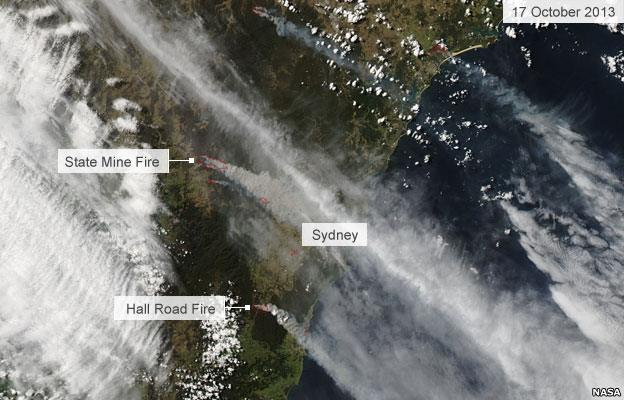
- Published20 October 2013
- Published18 October 2013
- Published17 October 2013
- Published8 January 2013
- Published9 January 2013
- Published12 January 2013